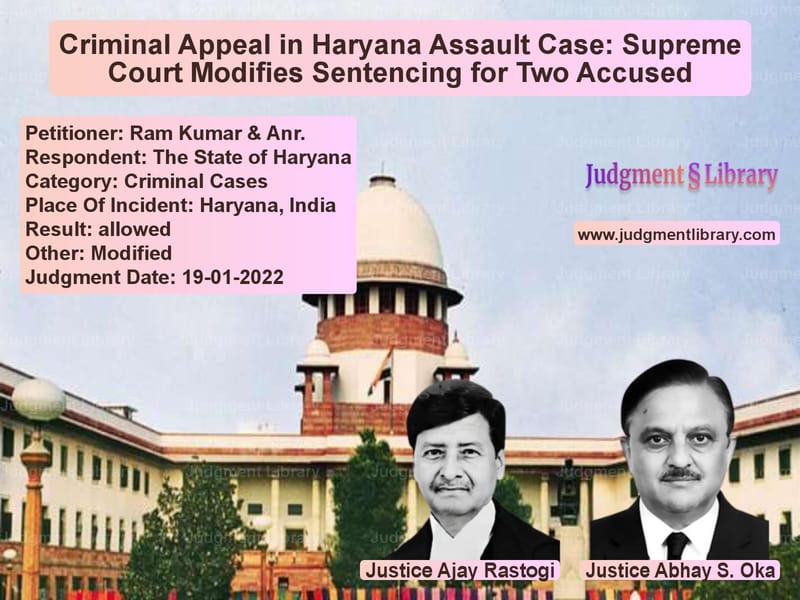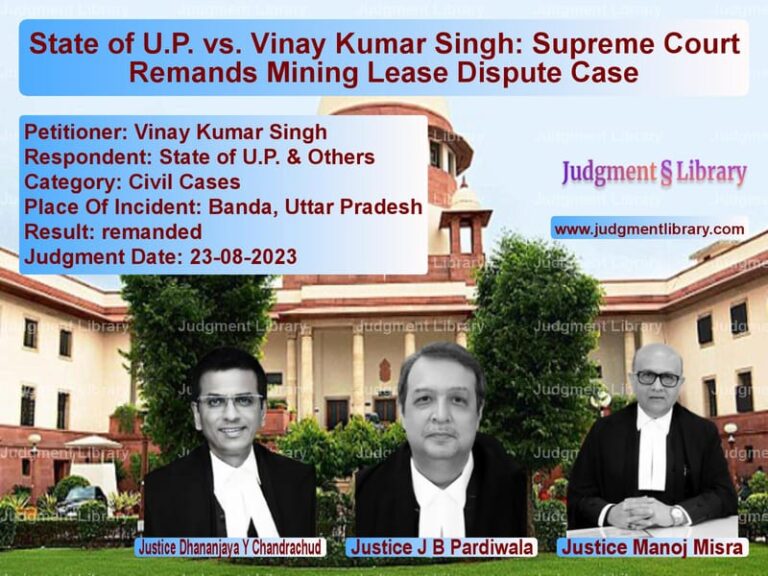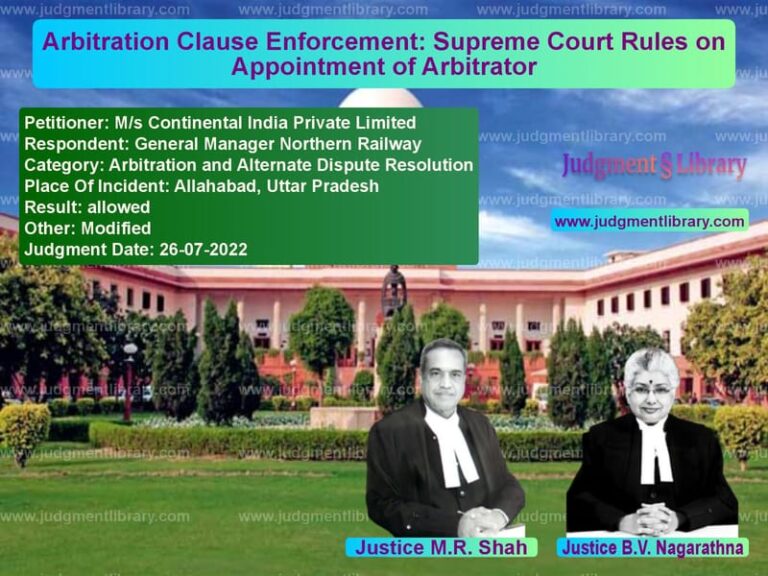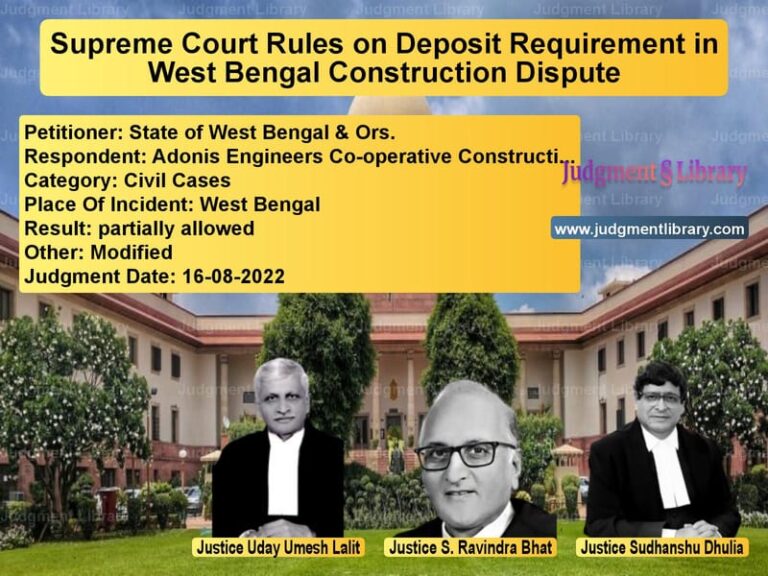Criminal Appeal in Haryana Assault Case: Supreme Court Modifies Sentencing for Two Accused
The case of Ram Kumar & Anr. v. The State of Haryana revolves around a criminal appeal against convictions under the Indian Penal Code (IPC). The appellants challenged their sentencing, arguing that they were not given the same relief as other co-accused, despite having similar roles in the offense. The Supreme Court examined whether the appellants were entitled to a reduction of their sentence based on parity and principles of justice.
Background of the Case
The incident in question took place in 2008 in Haryana, where a violent altercation occurred, resulting in serious injuries to multiple victims. Seven individuals, including the appellants, were accused of assaulting the victims using lathis and an iron rod.
After a detailed investigation, the police filed a chargesheet against the accused, and the case was tried before the Additional Chief Judicial Magistrate. All seven accused were convicted and sentenced as follows:
- Section 148 IPC: 3 months of rigorous imprisonment and a fine of ₹500.
- Section 323/149 IPC: 6 months of rigorous imprisonment and a fine of ₹500.
- Section 325/149 IPC: 1 year of rigorous imprisonment and a fine of ₹500.
The accused then appealed to the Sessions Court, which upheld their conviction. Unsuccessful in this appeal, they filed a criminal revision before the Punjab and Haryana High Court. The High Court partially granted relief by reducing the sentence of five accused to the time they had already served but denied the same relief to the appellants, Ram Kumar and his co-accused.
Arguments of the Petitioners (Ram Kumar & Anr.)
- The appellants’ role in the assault was identical to that of the five co-accused who were granted sentence reductions.
- The High Court had not provided any reasons for treating them differently.
- Since they had already served six weeks in custody, they should receive the same benefit as the other accused.
- The incident occurred in 2008, and more than 14 years had passed since then.
- The appellants had no criminal history and had not engaged in any unlawful activities since the case was registered.
Arguments of the Respondent (State of Haryana)
- The victims suffered serious injuries, including fractured ribs, proving the severity of the assault.
- The appellants actively participated in the attack and used lathis to cause grievous injuries.
- The prosecution presented strong eyewitness testimony linking the appellants to the crime.
- The sentencing by the trial court was based on the gravity of the offense and should not be interfered with.
Key Observations of the Supreme Court
1. Equal Treatment for Co-Accused
The Supreme Court noted that the High Court did not explain why the appellants were denied the same relief as the other co-accused:
“The High Court has not recorded any reasons for giving different treatment to the present appellants, despite their role being identical to that of the other accused.”
2. Use of Lathis in the Assault
The Court examined the prosecution’s evidence and found that all accused, including the appellants, had used lathis in the attack:
“The Sessions Court affirmed that all the accused had assaulted the victims with lathis. The prosecution witnesses consistently identified the appellants as participants in the attack.”
3. Eyewitness Testimonies and Medical Reports
The Court reviewed the testimonies of the victims and the medical reports:
- The prosecution produced five eyewitnesses who confirmed the appellants’ involvement.
- Medical reports revealed that one of the victims suffered a rib fracture due to the lathi blows.
- The injuries inflicted indicated intent to cause grievous hurt.
4. Time Already Served
Considering that the appellants had already served six weeks in custody and that the incident occurred in 2008, the Court reasoned that further imprisonment would not serve any additional purpose:
“Taking into account the facts of the case and the time already undergone, the substantive sentence of the appellants is reduced to the sentence already undergone.”
Final Judgment
The Supreme Court ruled in favor of the appellants and reduced their sentences to time already served. The key takeaways are:
- The appellants’ sentence was reduced in line with the other co-accused.
- The High Court’s failure to provide reasons for differential treatment was rectified.
- Given the passage of time and the minor nature of the injuries compared to serious offenses, further imprisonment was deemed unnecessary.
- The ruling emphasized the need for judicial parity in sentencing when multiple accused are involved in the same crime.
This ruling reinforces the principle that courts must ensure consistency in sentencing, especially when co-accused have played similar roles in a crime.
Petitioner Name: Ram Kumar & Anr..Respondent Name: The State of Haryana.Judgment By: Justice Ajay Rastogi, Justice Abhay S. Oka.Place Of Incident: Haryana, India.Judgment Date: 19-01-2022.
Don’t miss out on the full details! Download the complete judgment in PDF format below and gain valuable insights instantly!
Download Judgment: ram-kumar-&-anr.-vs-the-state-of-haryana-supreme-court-of-india-judgment-dated-19-01-2022.pdf
Directly Download Judgment: Directly download this Judgment
See all petitions in Bail and Anticipatory Bail
See all petitions in Attempt to Murder Cases
See all petitions in Extortion and Blackmail
See all petitions in Judgment by Ajay Rastogi
See all petitions in Judgment by Abhay S. Oka
See all petitions in allowed
See all petitions in Modified
See all petitions in supreme court of India judgments January 2022
See all petitions in 2022 judgments
See all posts in Criminal Cases Category
See all allowed petitions in Criminal Cases Category
See all Dismissed petitions in Criminal Cases Category
See all partially allowed petitions in Criminal Cases Category







